5 key facts about this project
The "Adaptive Commoning" project is located in the AEG turbine factory in Berlin and aims to tackle the city's critical shortage of affordable housing. The design seeks to breathe new life into this abandoned structure while minimizing environmental impact. By focusing on adaptable living spaces, it addresses the needs of various communities, including artists, multi-generational families, and unaccompanied refugee children, promoting a sense of belonging.
Modular Design
Incorporating multi-functional cross-laminated timber cubes, the design integrates modular units into the factory's existing framework. These units can be grouped together, allowing residents to personalize their living spaces according to individual preferences. The use of cross-laminated timber not only supports the structural requirements but also enhances sustainability through reduced waste and improved thermal performance.
Spatial Flexibility
The design prioritizes spatial flexibility, making it usable at different times of day and night. Long sections of the building illustrate its adaptability, capturing various moments of occupation. Perspectives of usage in both summer and winter highlight how the design remains comfortable regardless of the season, ensuring its functionality throughout the year.
Community Interaction
The master plan outlines how the spaces cater to the different communities, balancing shared and private living. By incorporating communal areas, the design encourages social interaction while respecting the need for personal privacy. This balance helps foster a sense of community, particularly for individuals who may struggle to find stable housing.
Natural light plays a vital role in enhancing the living experience within the factory. The layout allows sunlight to enter the spaces, creating an inviting atmosphere. Each cluster of timber cubes serves as a small community, where residents can gather in shared areas and retreat to their private units when needed. This thoughtful arrangement promotes interaction while maintaining individual comfort.


















































